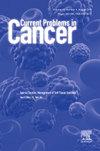Current management of uncommon EGFR mutations in non-small cell lung cancer
IF 2.3
4区 医学
Q3 ONCOLOGY
引用次数: 0
Abstract
Epidermal growth factor receptor (EGFR) mutations are frequently implicated in non-small cell lung cancer (NSCLC). Though these typically involve exon 19 in-frame deletions or L858R mutations in exon 21, uncommon EGFR mutations comprise 10-15 % of all EGFR mutations. These most frequently include G719X mutations in exon 18, L861Q mutations in exon 21, S768I mutations in exon 20, and in-frame insertions and/or duplications in exon 20. It is crucial to understand these distinct variants and their specific responses to active treatment options to optimize care. In this review, we discuss these uncommon mutations in depth and dissect the current literature regarding their treatment outcomes and subsequent evidence-based management guidelines.
非小细胞肺癌不常见表皮生长因子受体突变的管理现状
表皮生长因子受体(EGFR)突变经常与非小细胞肺癌(NSCLC)有关。虽然这些突变通常涉及外显子 19 的框架内缺失或外显子 21 的 L858R 突变,但不常见的表皮生长因子受体突变占所有表皮生长因子受体突变的 10-15%。最常见的包括外显子 18 中的 G719X 突变、外显子 21 中的 L861Q 突变、外显子 20 中的 S768I 突变以及外显子 20 中的框架内插入和/或重复。了解这些不同的变异及其对积极治疗方案的具体反应对优化治疗至关重要。在本综述中,我们将深入讨论这些不常见的变异,并剖析有关其治疗结果的现有文献以及随后的循证管理指南。
本文章由计算机程序翻译,如有差异,请以英文原文为准。
求助全文
约1分钟内获得全文
求助全文
来源期刊

Current Problems in Cancer
医学-肿瘤学
CiteScore
5.10
自引率
0.00%
发文量
71
审稿时长
15 days
期刊介绍:
Current Problems in Cancer seeks to promote and disseminate innovative, transformative, and impactful data on patient-oriented cancer research and clinical care. Specifically, the journal''s scope is focused on reporting the results of well-designed cancer studies that influence/alter practice or identify new directions in clinical cancer research. These studies can include novel therapeutic approaches, new strategies for early diagnosis, cancer clinical trials, and supportive care, among others. Papers that focus solely on laboratory-based or basic science research are discouraged. The journal''s format also allows, on occasion, for a multi-faceted overview of a single topic via a curated selection of review articles, while also offering articles that present dynamic material that influences the oncology field.
 求助内容:
求助内容: 应助结果提醒方式:
应助结果提醒方式:


